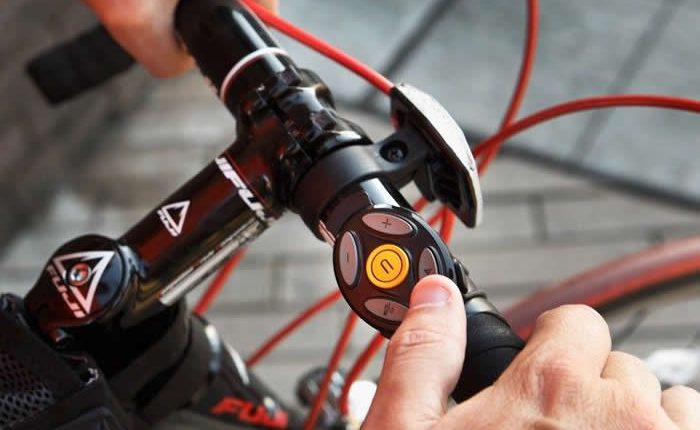It is illegal to wear both earbuds while riding, in even the most bike-friendly of states, like California. That makes sense — if you can’t hear the yells of other cyclists or pedestrians, or your music is so loud you drown out a car horn, the implications could be life-threatening. The Linx, a $199 smart bike helmet from Seattle hardware maker Coros, offers a solution in the form of bone conduction. That way, you can keep your ears free while listening to music, getting turn-by-turn navigation, and taking phone calls.
Bone conduction tech essentially uses vibrations sent through your cheekbones to bypass the ear drum. That way, audio can be sent from a linked mobile device and transmitted to your ears so only you can hear it, all while ensuring outside noise is still noticeable. The helmet also has the benefit of being indistinguishable from a standard one, save the small grey speakers attached to the straps.
There are three components to the Linx: a remote that straps to your handlebars, a companion mobile app, and the helmet itself. The helmet contains two bone conducting speakers, a microphone up top, and a battery and Bluetooth unit in the back. The remote is straightforward and lets you change volume, skip songs, and accept or end calls. Coros says the battery will keep the Linx active for up to 12 hours. (Thankfully, if the battery dies, you still have a working bike helmet.)
As for the mobile app, it comes with a way to track your fitness, plan routes, and track competitive racing times, if you’re into that. The app will also alert an emergency contact if the helmet detects you’ve fallen. There’s even a way to link two Lynx devices together, so you can communicate with teammates in the event you’re a more serious cyclist.
In my experience using the Linx here on the CES show floor, I can say the audio was crisp and clear. I didn’t get an opportunity to try it while riding. But as an avid commuter in San Francisco who too often uses earbuds while riding, the Linx is clearly a safer alternative to headphones that also happens to ensure you’re always protecting your head while riding. The company’s Kickstarter campaign was successfully funded back in September, and the Linx is now available from Coros’ website.
More information: The Verge




Comments are closed, but trackbacks and pingbacks are open.